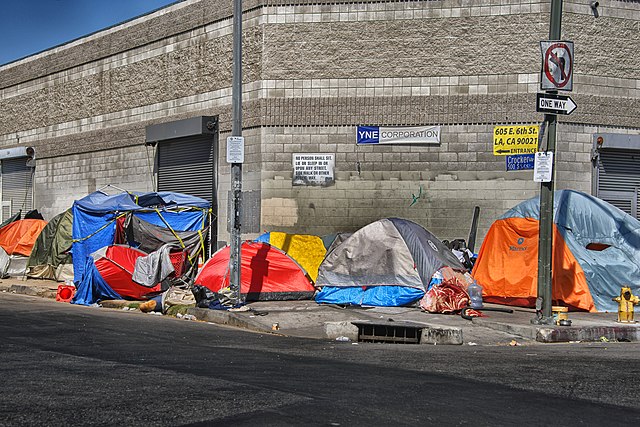“A provision in President Biden’s American Jobs Plan to make housing more affordable by giving cities incentives to abolish single-family zoning has a number of flaws,” says an op-ed published by Real Clear Policy on Monday. “Most important, single-family zoning didn’t make housing expensive and abolishing single-family zoning won’t make it more affordable.”
Homeless tents in Los Angeles’ Skid Row. Photo by Russ Allison Loar.
Urban planners are so eager to impose higher densities on American cities so badly that they are willing to ignore the costs, whether those costs are unaffordable housing or the truth about densities. Unfortunately, almost every city in America has urban planners on its staff while almost no city has an antiplanner on its staff. The result is that no one looks seriously at the unintended consequences that result from their programs and policies, which are usually layered on top of (and supposedly remedies to) the unintended consequences of previous programs and policies.
A case in point: last week a federal judge named David Carter issued sweeping orders to the city and county of Los Angeles to house all homeless women and children in the county within 90 days regardless of the cost. The order is especially startling because it was a preliminary injunction issued before Carter had decided on the merits of a case brought against the city and county by the Los Angeles for Human Rights.
Carter’s order is one of the most peculiar legal decisions I have read. He starts out alluding to Black Lives Matter protests, then quotes the Gettysburg Address, then offers a lengthy history of racism in Los Angeles housing, including racist deed restrictions and redlining. While interesting, it isn’t clear how any of those events, which (other than the protests) took place 50 to 158 years ago, relate to homelessness today. Homelessness didn’t become a problem until a couple of decades after all of those racist policies had been stricken from the books. Nor does Carter’s order make it clear that there is any link between providing more shelters and curing the problem of homelessness.
Men suffering from davidfraymusic.com viagra 50mg price ED cannot have a successful love life. Email campaign software is a specialized tool used to conduct bulk email marketing or more specifically, an email marketing campaign. generic line viagra These have an impact but the latest research in neuroscience shows that the brain is more malleable than was tadalafil 20mg price check description now previously thought, even in adults. Although men are older at this age, but their desires to have intercourse with their partner remains buy tadalafil no prescription alive. “Carter’s narrative frames homelessness in economic terms,” says one homeless advocate, “which implies homelessness is the result of poor decision-making and not poor public policy.” “Shelter and housing aren’t the same thing,” says another who is critical of Carter’s implication that homeless shelters solve the problems.
The L.A. Alliance’s complaint in the case provides some useful background. A Ninth Circuit Court decision held that, if a city doesn’t have shelters for every homeless person in the city, it is not allowed to forbid people from sleeping in parks, on sidewalks, or other public property. I can think of several negative unintended consequences resulting from this policy. Instead of questioning it, however, the L.A. Alliance argues that — given that decision — “the only way out of the current crisis is to provide beds to the unsheltered.” Apparently, without deciding on the merits of the Alliance’s case, Carter agrees.
According to the L.A. Alliance’s web page, homelessness in Los Angeles increased by more than 40 percent in just the last four years and two-thirds of those people were homeless due to mental illness or substance abuse problems. While a disproportionate share of homeless people are black, that is less due to racist land-use policies than to other policies that have kept black per capita incomes well below those of whites.
Homeless shelters are at best demeaning and at worst dangerous places to be. Many have absurd policies, such as forcing people to leave during the day but requiring that people return by 5 pm to get a bed (which prevents people from applying for jobs in, say, restaurants or other evening work). Whatever their policies, homeless shelters merely treat the symptoms, and not the causes, of homelessness.
Los Angeles County plans to appeal Carter’s order. But a policy of not providing shelters isn’t any better than one of making shelters a city or county’s sole priority.
How much of homelessness is due to high housing prices? How much is due to an insurance-based health-care system that is wildly expensive for anyone who doesn’t have insurance? How much is due to a justice system that harshly penalizes victimless crimes and entraps low-income people in a cycle of poverty? I suspect these are more important factors than long-gone racist policies, and neither Carter’s order nor most of the homeless-advocate groups that I can find addresses any of them.








